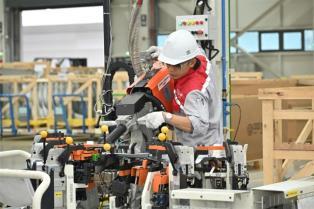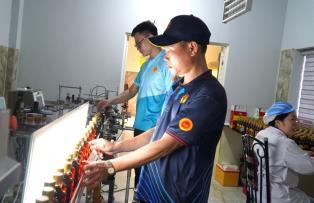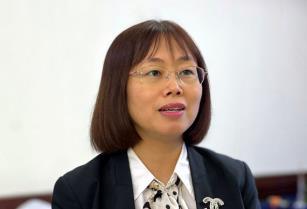Speaking to the Vietnam News Agency, Phạm Thị Thùy Linh, head of the Securities Market Development Department under the State Securities Commission of Vietnam, provided key insights into the ongoing preparations and strategic direction for the market’s development in the current period.

Việt Nam is intensifying efforts to transition its stock market from frontier to emerging status, a move expected to unlock international capital flows and elevate the country’s financial stature on the global stage.
However, experts emphasise that this transformation is not a short-term race but a long-term journey, requiring coordinated reforms across regulatory frameworks, technological infrastructure and corporate governance.
Speaking to the Vietnam News Agency, Phạm Thị Thùy Linh, head of the Securities Market Development Department under the State Securities Commission of Vietnam, provided key insights into the ongoing preparations and strategic direction for the market’s development in the current period.
How significant is the upgrade of Việt Nam's stock market for the country’s economy and financial sector?
Upgrading the stock market is not merely a target for the financial sector, it is a strategic step toward enhancing Việt Nam’s global position and competitiveness within the region and beyond. Achieving emerging market status would grant us access to higher-quality capital sources, particularly medium- and long-term investment flows from both passive and active funds.
However, this upgrade is not the ultimate goal. What truly matters is maintaining stability and ensuring the sustainable development of the market post-upgrade. We've seen cases where markets were upgraded but later downgraded due to a decline in quality and scale.
Our long-term vision is to develop a transparent, efficient and resilient securities market. One that protects investors, builds trust, and supports the country’s broader economic growth objectives.
What are the fundamental factors that enable Việt Nam to confidently move toward completing its stock market upgrade?
We are focusing on four key pillars to support the market upgrade. That are technology infrastructure, legal framework, trading mechanisms, and monitoring and management capacity.
A major milestone is the launch of the new KRX trading system in May 2025. This system significantly enhances processing capacity, ensures safety and transparency, and lays the groundwork for introducing advanced market features.
On the legal front, the Ministry of Finance has issued critical circulars to address previously unmet upgrade criteria, such as improving the payment cycle and resolving failed transaction costs. In addition, we have mandated that 100 per cent of listed companies disclose information in English, boosting transparency for foreign investors.
We are also implementing a range of synchronised reforms, including easing foreign ownership limits, streamlining administrative procedures, accelerating digital transformation and strengthening investor protection. Together, these initiatives are creating a solid and sustainable foundation for Việt Nam’s stock market to meet international standards and support long-term growth.

The issue of foreign ownership limits is drawing significant attention. Can you elaborate on the reform direction in this area?
Foreign ownership is a critical factor in the assessment process conducted by international organisations like MSCI when evaluating market upgrades. Currently, many domestic companies have low or even zero foreign ownership, despite operating in sectors without foreign ownership restrictions.
To address this, we are coordinating with various ministries and agencies to review and expand the list of industries open to foreign investors, with the exception of sensitive areas related to national security and defence. At the same time, companies themselves need to proactively adjust their business licences to focus on key industries, thereby increasing their foreign ownership ratios, attracting capital, and improving governance.
Additionally, the draft amendment to Decree No 155/2020/NĐ-CP, which guides the implementation of certain provisions of the Securities Law, is being finalised. This amendment requires companies to clearly disclose foreign ownership ratios and removes the need for approval from the General Meeting of Shareholders for these ownership limits. The change aims to facilitate international capital flows, enhance transparency, and align Việt Nam’s market practices with global standards.
This reform is a significant step in completing the legal framework and will play an important role in supporting the sustainable development and upgrading of Việt Nam’s stock market.
With increasing focus on stock supply from FDI enterprises and State-owned enterprises, how do you assess the prospects for their contribution to the market?
To build a deep and stable stock market, it is essential to maintain a healthy balance between supply and demand. Currently, the market’s scale and quality of listed shares remain limited, so it is crucial to increase listings from enterprises with FDI origins and equitised State-owned enterprises that meet listing criteria. This approach not only expands the supply of quality stocks but also enhances business performance, making the market more attractive to foreign investors.
Additionally, the integration of IPOs with listings has been institutionalised, which accelerates cash flow circulation and enhances the appeal of both the primary and secondary markets. We will continue to review and refine regulations to encourage more enterprises to list.
At the same time, we are working to develop new market segments, such as carbon credit trading platforms and capital markets for start-ups, aligning with Việt Nam’s broader sustainable development goals.
How do you anticipate international investors will respond to the recent reforms in Việt Nam’s stock market?
We have received very positive feedback from international investors, particularly following the launch of the KRX trading system and the implementation of key legal reforms. Large investment funds from the US, Europe, and Asia have recognised the strong potential of the Vietnamese market, citing factors such as robust economic growth, political stability and ongoing institutional reforms.
Additionally, organising investment promotion conferences in major international financial centres has helped us better understand investor expectations and showcase Việt Nam as a dynamic market committed to reform and global integration. Our efforts to reform foreign ownership policies, trading mechanisms, information disclosure, and investor protection have all been highlighted as significant strengths by the international community.
Do you have any message for domestic businesses and investors as Việt Nam prepares to complete the stock market upgrade?
This is a crucial moment for businesses, investors and securities firms to enhance their capabilities, standardise operations and improve transparency and governance. While upgrading the market opens the door for increased foreign capital inflows, it also demands the development of a stronger, more professional domestic market.
Enterprises that actively engage with the capital market by providing transparent information and adhering to standardised business practices will play a vital role in attracting investors and raising market quality. Similarly, securities companies must focus on improving service quality and streamlining processes to better support both domestic and international investors.
With the shared commitment and determination across the system, the State Securities Commission is confident that Việt Nam will not only achieve a successful market upgrade but also establish a sustainably developed stock market that serves as an effective capital mobilisation channel and an appealing destination for global investors. — VNS





